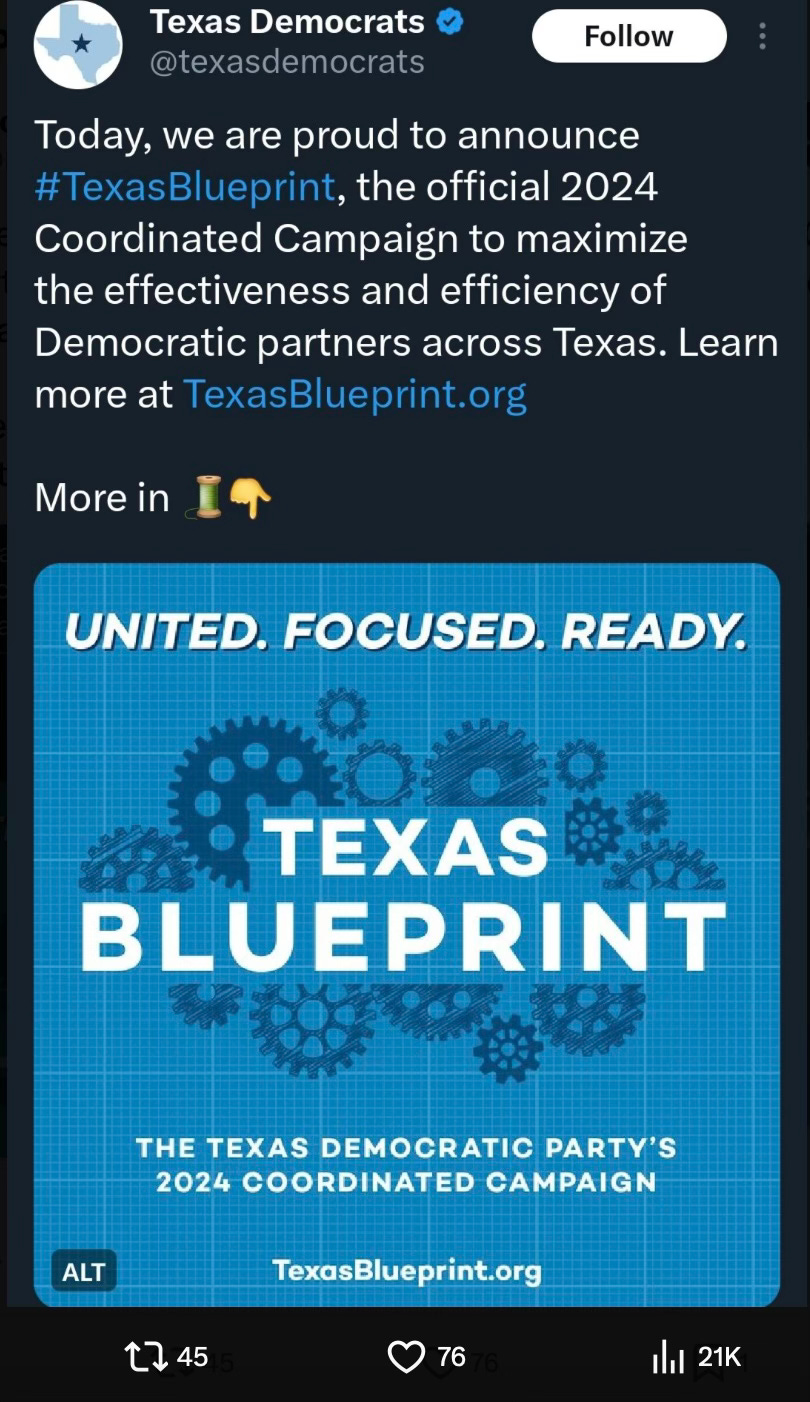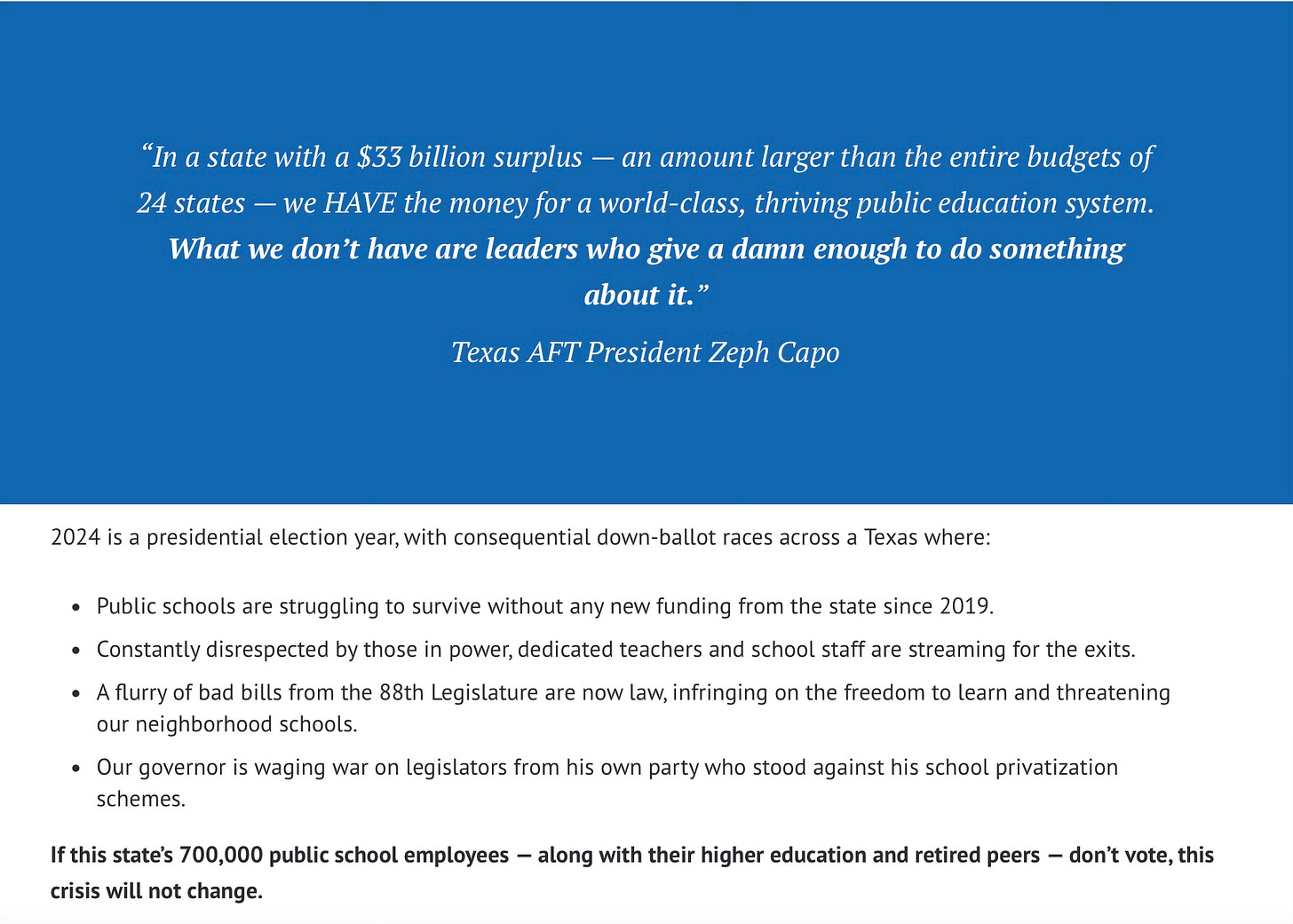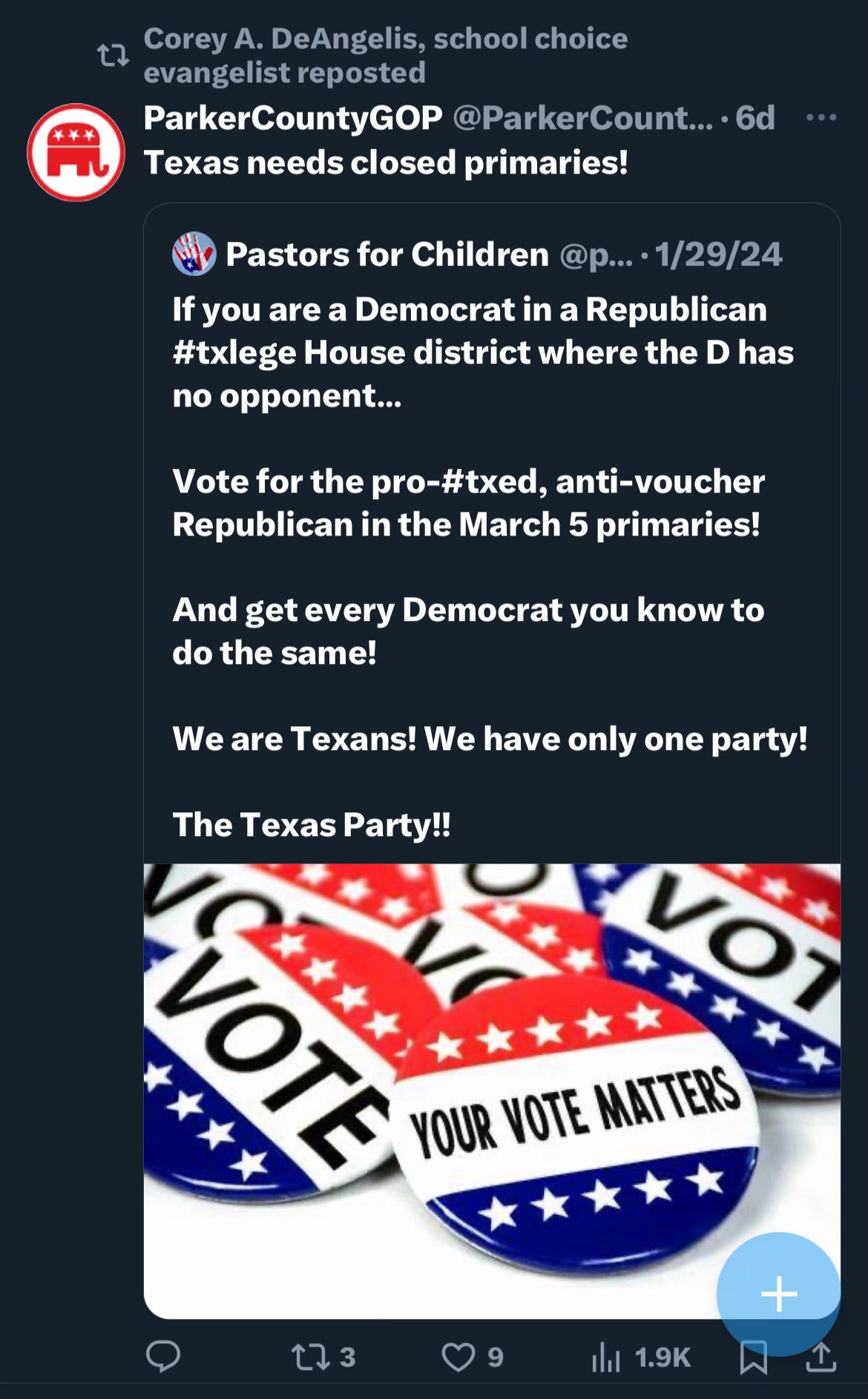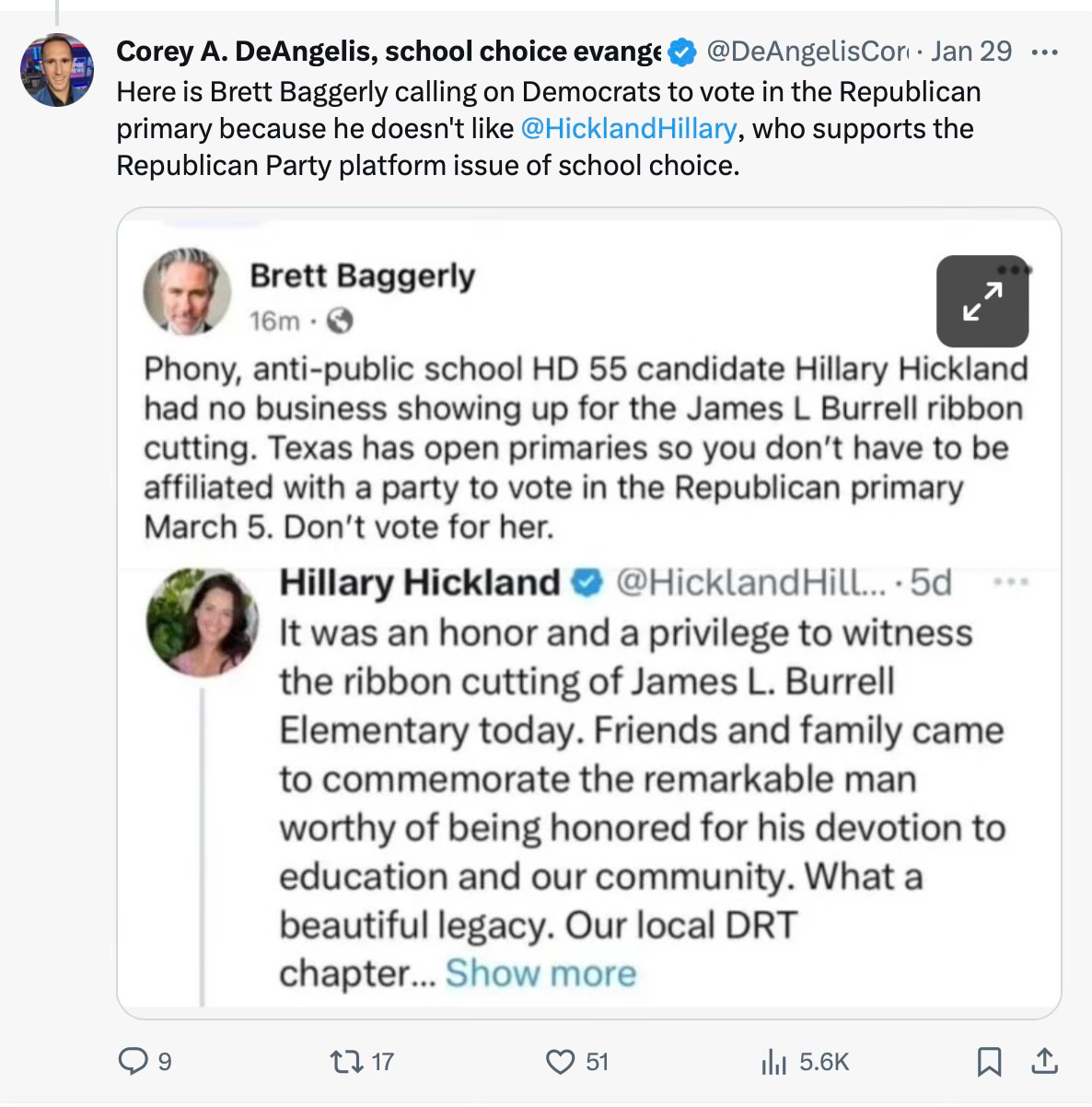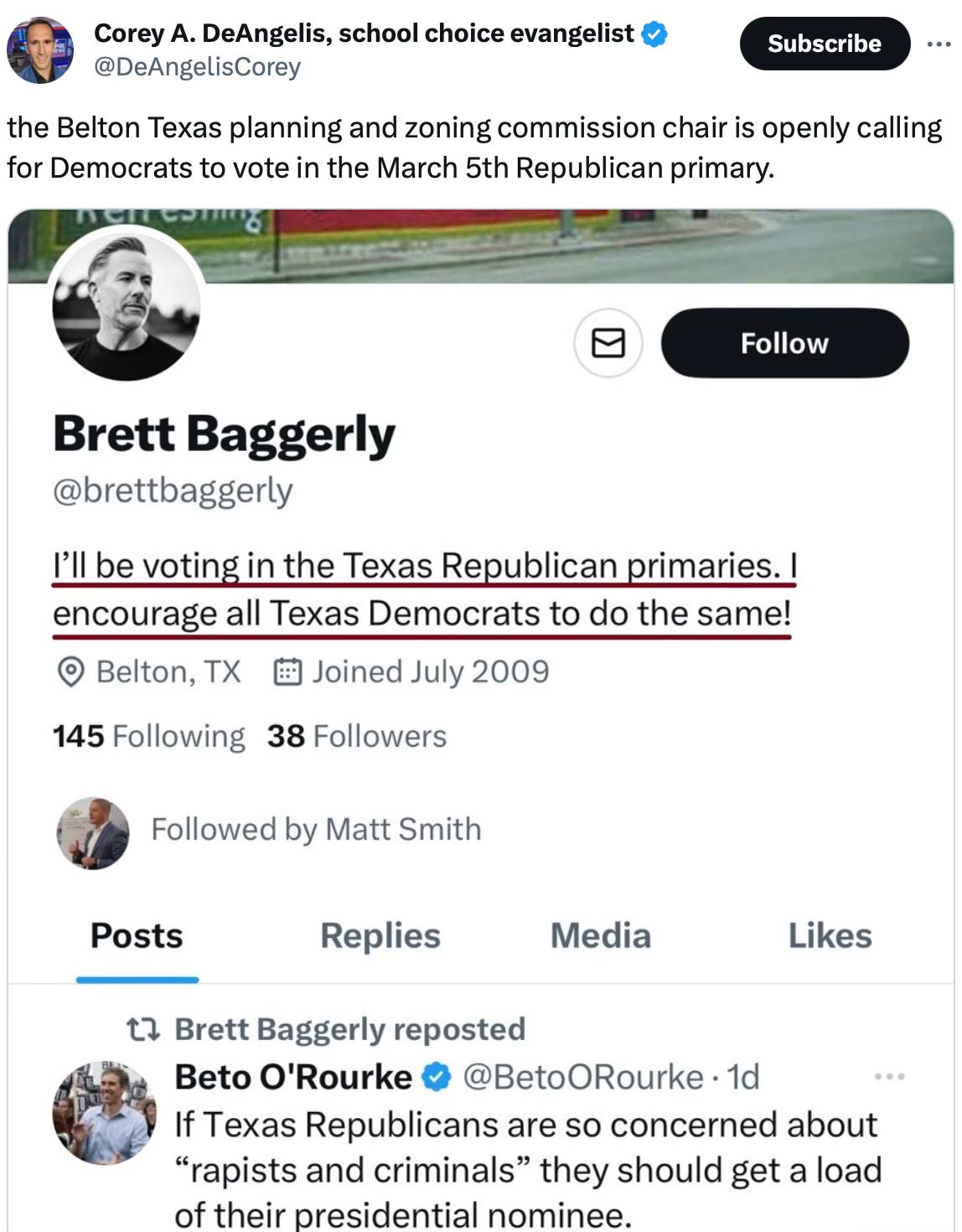
Texas’ Democrat-led public education system has a big challenge this primary election cycle and if overcoming it requires hook or crook, crook in the form of Democrats voting in Republican primaries seems the chosen option.
The challenge is the protection and preservation of public education’s monopolistic hold on Texas K-12 students as discussed in School Choice Debate Shows Texas Public Ed More “For the System” than “For the Children.” And the course of action it seems is Democrats planning to vote in Republican primaries.
The public education industry views Texas’ recent movement toward school choice legislation as a major threat and has therefore adopted a “kill it in the crib” mentality. Can’t win on substance (i.e., the issue)? Then up next is style meaning that with few areas having significantly competitive Democrat races, targeting Republican primary contests becomes the emerging strategy.
Historical context
Texas’ “Republican-controlled” House of Representatives has long been a disappointment to many Republican voters – especially those comprising the party’s conservative grassroots wing.
This quandary’s origin dates back to the 1980s and early 1990s. As some Texas Democrats genuinely switched parties based on newfound ideological commonality with Republicans, others recognized political marketability increasingly required an “R” versus a “D” next to their name such that party affiliations were changed despite liberal policy positions remaining largely unchanged.
This second group’s influence permeates today’s Texas House as liberal Republicans routinely join Democrats to elect theoretical Republican House speakers who then give chairmanships to Democrats and too often show favoritism to leftist agendas rather than functioning as a Republican majority leader tasked with securing Republican priorities.
48 Conservative Bills the Texas House Killed This Session details recent opportunities lost and per political commentator Luke Macias are “examples of some of the legislation that died by the hands of House leadership.”
How House “Republicans” operate took center stage in the recent legislature’s fourth special session when 21 Republicans joined Democrats to support an amendment stripping school vouchers from an education funding bill.
Political repercussions include 16 of these legislators now facing serious reelection challenges with some candidates having Gov. Greg Abbott’s endorsement often in part due to the incumbents’ school choice opposition. One’s support of targeting Attorney General Ken Paxton for impeachment is another issue further increasing intensity of these races.
How political hacksterdom could work
One Republican Party of Texas legislative priority unaddressed over recent sessions is election integrity. Within identified action, the Party specifies the need to “establish closed primaries in Texas.”
Our primaries are currently “open” meaning that voters can cast ballots in either party’s primary. For this election, therefore, the public education industry can potentially circumvent conservative voter will by deploying its allies to cast ballots for Republican incumbents known to have liberal voting records.
The Republican ballot will also include 13 ballot propositions including two generating serious irony seeing how this primary cycle looks to be shaking out.
The first proposition of interest:
Proposition 9
The Republican Party of Texas should restrict voting in the Republican primary to only registered Republicans.
YES
NO
The Texas Democratic Party website includes lofty statements of “inalienable rights that even a majority may not take away” including “the right to cast an unimpeded vote to gain fair representation in the democratic process.” Such rhetoric, however, falls short when plans appear underway to crash another party’s primary and help public education industry cohorts “game” the election outcome - including to vote against measures like Proposition 9 which restrict this exact type of activity!
The other proposition of interest:
Proposition 11
Texas parents and guardians should have the right to select schools, whether public or private, for their children, and the funding should follow the student.
YES
NO
An article, Rep. Hugh Shine’s Media Profile Expanded With School Choice Opposition, noted the following:
The 2022 Republican Primary ballot contained a proposition asking voters if “Texas parents and guardians should have the right to select schools, whether public or private, for their children, and the funding should follow the student.” Statewide, 87.78 percent voted “yes.” In Bell County, that number rose to 89 percent.
And this sentiment is not new. The 2012 Republican Primary ballot similarly featured a proposition that “allowed parents the freedom to choose their child’s school.” Statewide, 84.6 percent voted in favor of the proposition. In Bell County, that number was 84.85 percent.
Polling information is tricky based on who is asking the questions, who is being asked and how those questions are asked. That said, even The Texas Tribune reports how a University of Texas at Austin survey found a plurality of voters support some version of school choice while a Texas Hispanic Policy Foundation and WFAA poll “shows a majority of Texans want to expand school choice and allow parents to use tax dollars to send their children to private school.”
The opportunity for crossover voting to reduce numbers supporting this primary ballot proposition (and thereby blunting these talking points) is lost neither on the public education industry nor its Democrat allies.
The mobilization
It’s first important to note how the alliance between Democrats and the public education industry is easily identifiable.
Note how “Union of Professionals” Texas AFT and National Education Association-affiliated Texas State Teachers Association are both listed as founding partners of the Texas Democratic Party’s 2024 Coordinated Campaign.
Texas AFT also features this on its website.
Action items revealed
The following posts target the House District 55 race in which incumbent Rep. Hugh Shine, R-Temple, faces three challengers.
Brett Baggerly, Belton Planning and Zoning Commission Chair, specifically addresses “phony, anti-public school HD 55 candidate” Hillary Hickland and in doing so, encourages fellow Democrats to help tip the election scales for Shine, a candidate recognized for his liberal voting record.
Shine’s apparent history as a Democrat was an issue in his 1990 Republican primary race seeking to replace U.S. Rep. Marvin Leath, D-Waco. (Shine prevailed in the primary, but lost the General Election to Democrat Chet Edwards.)
With longtime political aspirations and an overall Texas House record documented as consistently pro-government/special interests rather than pro-taxpayer (click here, here, here, here, here and here), Shine’s leftist positions seem likely to make him an appealing choice for Democrats seeking to undermine Republican voters.
Think it can’t happen?
Think again. Nikki Haley, New Hampshire.
In October 2023, the New Hampshire Bulletin reported the following:
Nearly 4,000 New Hampshire Democratic voters changed their party affiliation ahead of the state’s presidential primary next year, the New Hampshire Secretary of State’s Office announced Wednesday – a possible indication that they plan to participate in the Republican primary.
The office further detailed how 3,542 registered Democrats had switched their registration to “undeclared” while an additional 408 switched to be registered as Republicans. These changes, allowed during a window that ran Sept. 14 and Oct. 7, enabled “undeclared” voters to vote in either party primary while the “declared” were bound to vote in their designated party primary.
With the state’s Jan. 23 primary, The Hill offered this detail:
Seven in 10 voters supporting Nikki Haley in the New Hampshire GOP primary were not registered Republicans, according to a CNN exit poll.
The poll found 70 percent of voters who backed Haley in the primary on Tuesday were undeclared, or independent, while only 27 percent were Republicans. The remaining 3 percent were unregistered as voters before participating in the primary.
The breakdown for former President Trump’s support in the primary was the exact opposite, according to the exit poll. It found that 70 percent of Trump voters were registered Republicans, while 27 percent were undeclared, and 3 percent were previously unregistered as voters.
Despite being defeated 54% to 43% in New Hampshire, losing to “none of these candidates” in Nevada and grim prospects in South Carolina, Haley vows to continue on. As her liberal record and disconnected relationship to voters mirrors many embattled Texas House representatives, don’t be surprised to see her spending time in Texas ahead of the March 5 primary.
Final thoughts
Many Republican voters are tired of the status quo. Tired of institutions like the public education industry consistently failing their children. Tired of establishment politicians providing lip service to the same issues year after year with progress being minimal if at all. The Texas House is what some might call a “hot political mess” – and Republicans are largely to blame.
Potentially gaming the election system or downright cheating? Depends on your perspective, but since 2020 we’ve learned robust election turnouts are critical as a means of “outvoting” any steal. Once considered a federal election issue, its prospect is a now strong potential in many Texas races.
Voting for new approaches to old issues like education reform and parental empowerment, voting for fresh representation to address these challenges. That’s the way forward.
Early voting starts Tuesday, Feb. 20. Election Day is Tuesday, March 5. Vote!
Lou Ann Anderson is a writer, former radio producer and current podcaster at Political Pursuits. Her tenure as Watchdog Wire–Texas editor involved covering state news and coordinating the site’s citizen journalist network. As a past Policy Analyst with Americans for Prosperity–Texas, Lou Ann wrote and spoke on a variety of issues including the growing issue of probate abuse in which wills, trusts, guardianships and powers of attorney are used to loot assets from intended heirs or beneficiaries. She holds a degree from the University of North Texas in Denton.




